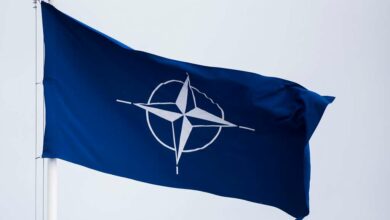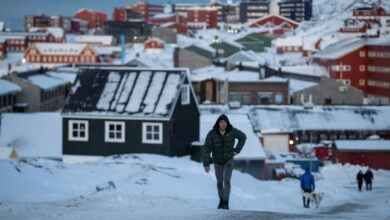Greetings from Athens, the birthplace of democracy, where I have just attended a conference during which Europeans and Americans eyed what could be the birth of democracy in the Arab world with a mixture of admiration and wariness.
It’s not that they are unhappy about the uprisings in Tunisia, Egypt, Libya and elsewhere: like most people around the world, this crowd is amazed at the courage of protesters and supportive of their aim at a better life and better government. But this is a NATO conference, full of security types, who tend to be the glass-is-half-empty kind of people. As Western countries consider imposing a no-fly zone over Libya and warships congregate in the Mediterranean, they naturally wonder what these revolutions will mean for them.
Since NATO is a military alliance, the issue of military intervention immediately arises. Whether such an intervention takes place through NATO or through the actions of individual member states, there is little appetite for military adventurism after the debacles of Afghanistan and Iraq. Most here insist that such an intervention should only occur with a clear UN mandate and consent of the population. Yet again the imbalance of NATO shows, since everyone knows an operation as complex as imposing a no-fly zone (which, remember, starts with attacking Libya’s air defenses) is something impossible to do without the United States. No other country has the resources to implement it, and few have the appetite to pay for it at a time of drastic cutbacks in budgets. I may be over-optimistic about this, but I think we may be finally reaching a point when the West is starting to rethink the harmful doctrine of humanitarian interventionism (with all of its neocolonialist implications) that has reigned in the last 20 years.
The Europeans, in particular, are more interested in “soft security” issues–notably what the likely prolonged political and economic unrest on the south side of the Mediterranean will mean for them in terms of increased immigration and instability. Italians are already dealing with new boatloads of Tunisians landing in Lampedusa, the island that is closer to Africa than the Italian mainland, escaping the troubles at home. Immigration is a high-visibility domestic issue at home, and European politicians cannot afford to ignore it. In the past, they came to arrangements with the dictatorships to help them contain it–rather outrageously, they have been goading countries like Libya into providing processing centers for sub-Saharan African migrants that transited through the Maghreb. There is little alternative to greater cooperation to manage migration flows, but a solution that integrates the interests of both sides as well as human rights concerns has eluded governments for decades. It may now just get more complicated.
There is, of course, the worry about oil prices. Disruptions to Libya’s supply may have only cut world production by 1 percent, but prices immediately reached towards $120 a barrel and some worry it could go even higher than the peak of 2008. As more countries become affected by the instability, many eye Saudi Arabia warily. Riyadh has promised to boost production to compensate for Libya’s shortfall, which the markets responded well to, but what if it becomes affected itself? In this age of unpredictable uprisings, there’s no telling what will happen, even if King Abdullah has loosened the purse strings and is now showering $36 billion onto the Saudi population. Some no doubt remember that, in the years before the Iranian revolution, the Shah was also spending the windfall of the 1973 oil crisis on the country, a factor that (by causing high inflation) contributed rather than prevented the uprisings that began in 1978.
Besides, many people here have intuitively understood that while socio-economic inequality and poverty are part of the problem, a more important issue is one of dignity. That message was made abundantly clear by the protests in Tahrir Square: something has changed among the Arabs, people here think, and the previous status quo is over. What comes next, though, is uncertain. My Greek hosts, who are going through their own economic and political crisis (there large protests on a daily basis here) understand this all too well.
As expected, Islamists are a big issue of concern. There is a lot of educating to do here: some people who should know better have asked me with incredulity why veiled women are protesting for freedom. Europeans, in particular, have an aversion to religious movements and a hard time accepting that Islamists might also want democracy–or that many Arabs are religiously conservative and have a different idea of the interplay between state and religion. They look at the Islamists’ record in protesting against the Danish cartoons (forgetting that governments launched that campaign) or, say in Egypt, their attempts to block laws against female genital mutilation, and shudder. If, as I believe, Islamist movements across the region are about to undergo their own internal revolutions, that Western perception could change fast.
But Europe’s idea of what is good for the Arabs also needs a readjustment, for too long their own ignorance and prejudice have conveniently dovetailed with the economic and strategic reasons for its support for dictatorships. We only need to think of the Western support for the Algerian army’s coup after an Islamist electoral victory in 1992 and its disastrous results.
The good news in all this is that the West, for its own interests as well as altruistic motives, wants to help. The bad news is that they are not sure how. Hopefully, its Arab partners will now have governments that will truly work for the national (rather than regime) interest, and will have a clearer idea of what their population need and more effective ways of delivering it.



